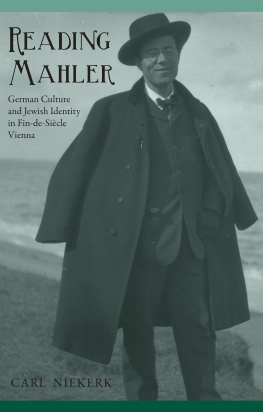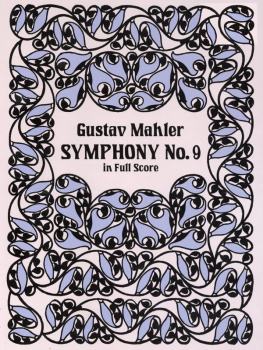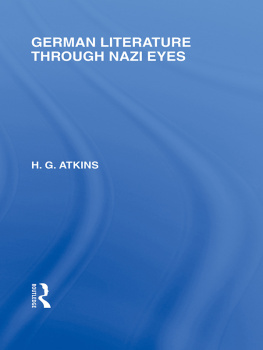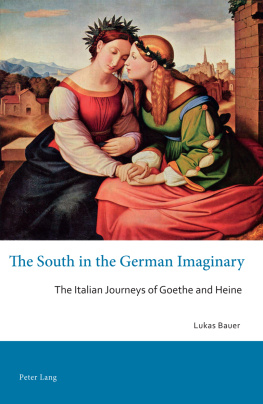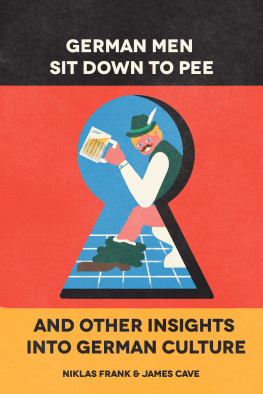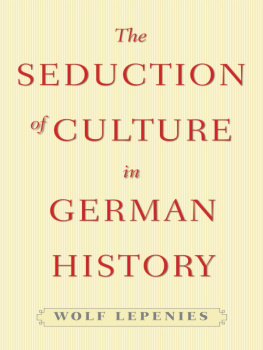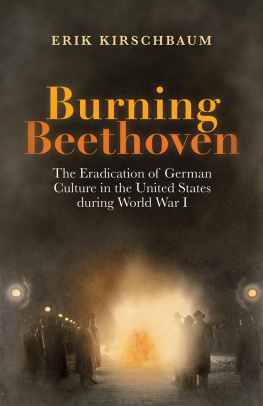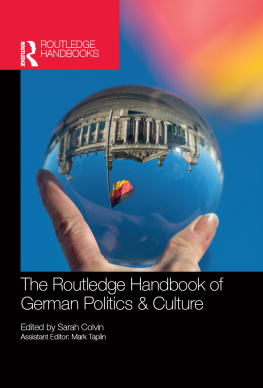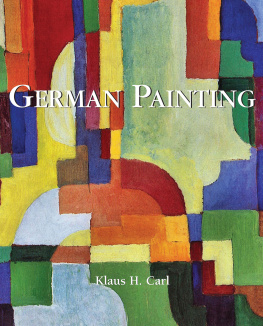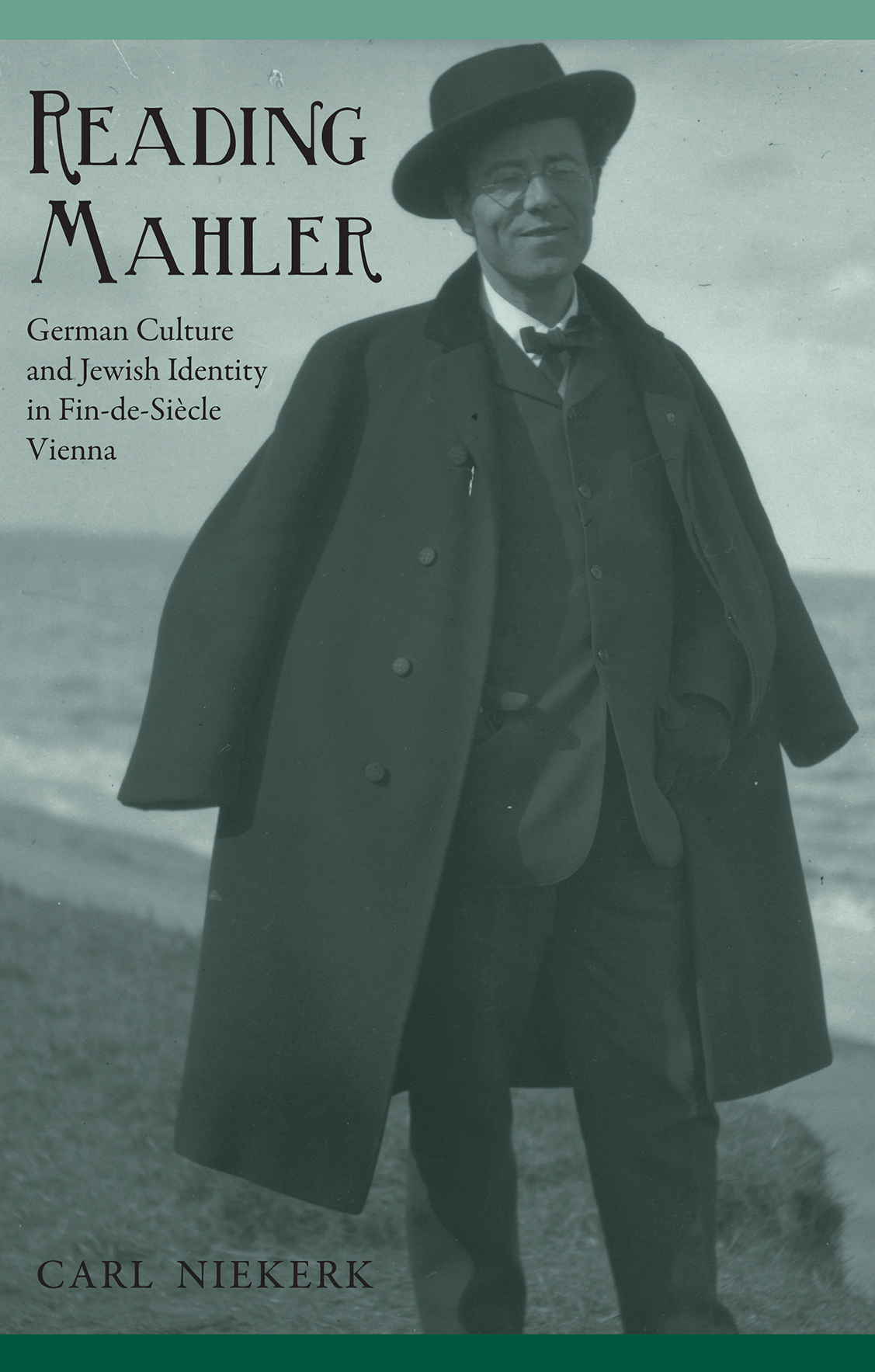Acknowledgments
E arly versions of parts of chapter 3 were published in German Quarterly 77.2 (2004): 189210, and in Sound Matters: Essays on the Acoustics of German Culture , ed. Nora M. Alter and Lutz Koepnick (New York: Berghahn, 2004), 4964. Earlier versions of chapter 4 appeared in Legacies of Modernism: Art and Politics in Northern Europe, 18901950 , ed. Patrizia C. McBride, Richard W. McCormick, and Monika agar (New York: Palgrave, 2007), 2940, and in Dutch in De Gids 170.2 (Feb. 2006): 16674. All of these texts have since been substantially rethought and rewritten. Chapter 5 is a slightly reworked version of an article published in Musical Quarterly 89.23 (2006): 23772. I am very grateful for the excellent suggestions this journals anonymous readers made, which not only contributed to a better text but also gave me a sense of the problems of doing truly interdisciplinary work and of the potential readership for my book. Some of the material discussed in chapter 6 was taken from my essay The Romantics and Other Cultures, published in the Cambridge Companion to German Romanticism , ed. Nicholas Saul (Cambridge: Cambridge UP, 2009), 14762. Many thanks to the editor of that collection for proposing the topic of the essay in the first place and for his many valuable suggestions.
Work on this book began in the fall of 2003 and was facilitated by a sabbatical leave from the University of Illinois at Urbana-Champaign and by a grant from the Andrew W. Mellon Foundation, which made an additional one-semester leave possible and came with a generous research account. Two conferences were especially influential in shaping this project. The Sixth Biennial Minnesota Forum Northern Light/Northern Darkness? Rethinking Modernism after the Demise of the Master Narrative: Art and Politics in Northern Europe, 18901950, 2527 April 2002, at the University of Minnesota in Minneapolis gave me some important stimuli to further pursue this project. My talk as a last-minute stand-in at the Thirteenth Bard Music Festival, Mahler and His World, at Bard College, Annandale-on-Hudson, on 17 August 2002 introduced me to the work of many interesting scholars in the field of German musical and cultural studies who have shaped the intellectual contours of this project.
Conversations with Matti Bunzl, Cori Crane, Stefani Engelstein, Michael Finke, Barbara Fischer, Jeff Grossman, Martina Hamidouche, Wal Hassan, Stephanie Hilger, Stephen Jaeger, Laurie Johnson, Brett Kaplan, Bill Kinderman, Lutz Koepnick, Francien Markx, Patrizia McBride, Jim McGlathery, Peter McIsaac, Elizabeth Oyler, Paul Reitter, Michael Rothberg, Helmut Walser Smith, Mara Wade, Marc Weiner, Meike Werner, and Yasemin Yildiz helped form this project and contributed to a better understanding of the issues discussed in this book. Some of them also read parts of the manuscript. I am very grateful for their many suggestions and I hope that nobody will be disappointed by what I did with them. My interest in fin-de-sicle Viennese literature and culture goes back to my undergraduate and early graduate school days, when I took classes with Walter Schnau, Egon Schwarz, and Ulrich Weinzierl (at the time visiting critic-in-residence at Washington University) on Austrian literature, culture, and intellectual history. The latter scholar, together with my colleague Bruce Murray, has proved to be a reliable source of knowledge about Viennese culture past and present. My interest in German-Jewish culture was greatly encouraged by the DAAD-NEH seminar on the culture of masochism, led by Sander Gilman (Cornell, Summer 1995). Emma Betz, Adam Chambers, Mary DeGuire, Jim Edenstrom, and Kathleen Smith at various stages worked as perpetually reliable research assistants with me on this project and their observations at times also influenced its final profile. I would also like to thank Margaret (Peg) Flynn and Sue Innes for their careful editorial work on my text.
I am grateful to my father not just for letting me grow up in a house full of music but also for sharing some of his immense knowledge of music and musical history with me, and for giving me some insight into the functioning of a professional symphony orchestra through anecdotes about his eight-year term as vice-president of the board of the Northern Netherlands Symphony and his membership of the programming committee of that same institution. While I was working on this project, two of the people closest to me were diagnosed with cancer. On 8 July 2006, my mother, Willemien Niekerk-Timmer, one of the healthiest people I know, died after a courageous eleven-month struggle with lung cancer. A little more than half a year later, my wife Laurie was diagnosed with what turned out to be a complex case of breast cancer that necessitated a yearlong intensive treatment. Their experiences will always be with me. I would like to dedicate this book to our children, Naomi and Maaike (now 8 and 6 years old), for their (Montessori-trained) inquisitive personalities, their many jokes and seemingly perpetual good moods, and their willingness to let their father listen not just to K3 or Dirk en de Liedjesband, but also to the music of Mozart and Stravinsky, and the occasional Mahler symphony.
Abbreviations
AC Nietzsche, Friedrich. The Anti-Christ, Ecce Homo, Twilight of the Idols, And Other Writings . Translated by Josefine Nauckhoff and Adrian Del Caro. Cambridge: Cambridge UP, 2005.
AF Wagner, Richard. The Art-Work of the Future. In The Art-Work of the Future and Other Works , translated by William Aston Ellis, 69213. Lincoln: U of Nebraska P, 1993.
Br Mahler, Gustav. Briefe . Edited by Herta Blaukopf. 2nd rev. ed. Vienna: Paul Zsolnay Verlag, 1996.
BT Nietzsche, Friedrich. The Birth of Tragedy and Other Writings . Translated by Ronald Speirs. Cambridge: Cambridge UP, 2004.
DKdZ Wagner, Richard. Das Kunstwerk der Zukunft. In Smtliche Schriften und Dichtungen , 3:42178. Leipzig: Breitkopf & Hrtel, 1911.
GME Bauer-Lechner, Natalie. Gustav Mahler in den Erinnerungen von Natalie Bauer-Lechner. Edited by Herbert Killian. Rev. ed. Hamburg: Verlag der Musikalienhandlung Karl Dieter Wagner, 1984.
GR Mahler, Gustav. Ein Glck ohne Ruh: Die Briefe Gustav Mahlers an Alma . Edited by Henry-Louis de La Grange and Gnther Wei. Berlin: Siedler, 1995.
GS Nietzsche, Friedrich. The Gay Science: With a Prelude in German Rhymes and an Appendix of Songs . Translated by Josefine Nauckhoff and Adrian Del Caro. Cambridge: Cambridge UP, 2001.
GSL Schein, Ida. Die Gedanken- und Ideenwelt Siegfried Lipiners . PhD diss., University of Vienna, 1936.
MP Adorno, Theodor W. Mahler: Eine musikalische Physiognomik . In Gesammelte Schriften 13:149319. Frankfurt am Main: Suhrkamp, 1997.
MPE Adorno, Theodor W. Mahler: A Musical Physiognomy . Translated by Edmund Jephcott. Chicago and London: U of Chicago P, 1996.
RA Wagner, Richard. Religion and Art. In Prose Works , vol. 6, translated by William Ashton Ellis, 21152. New York: Broude Brothers, 1966.
RGM Bauer-Lechner, Natalie. Recollections of Gustav Mahler . Translated by Dika Newlin. Edited by Peter Franklin. Cambridge: Cambridge UP, 1980.
RK Wagner, Richard. Religion und Kunst. In Smtliche Schriften und Dichtungen, 10:21185. Leipzig: Breitkopf & Hrtel, 1911.
SM Goetschel, Willi. Spinozas Modernity: Mendelssohn, Lessing, and Heine . Madison: U of Wisconsin P, 2004.
SSLD Mitchell, Donald. Gustav Mahler: Songs and Symphonies of Life and Death . Woodbridge, UK: Boydell, 2002.
SW Nietzsche, Friedrich. Smtliche Werke: Kritische Studienausgabe in 15 Bnden . Edited by Giorgio Colli and Mazzino Montinari. Munich, and New York: DTV; Berlin: de Gruyter, 1999.

